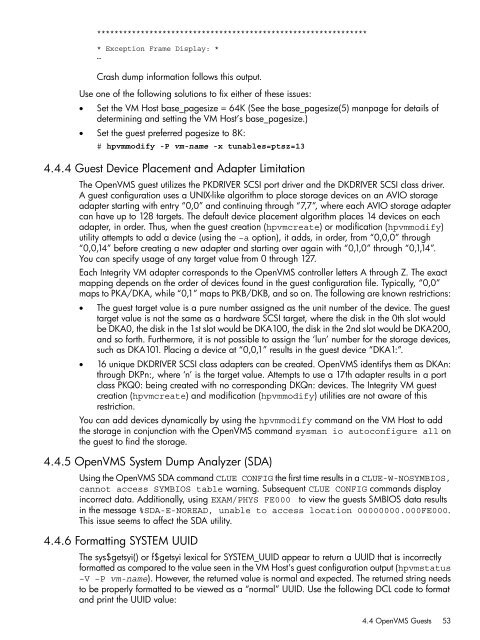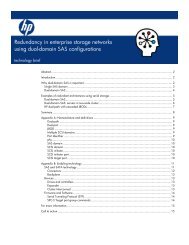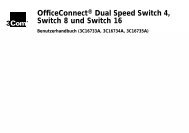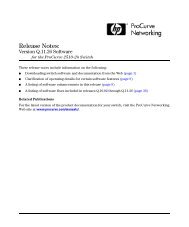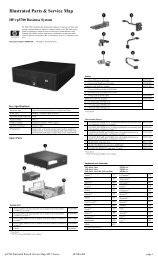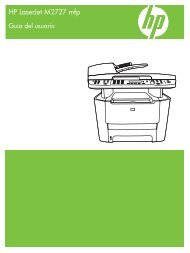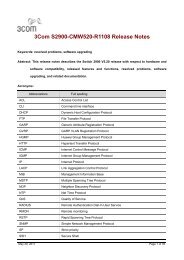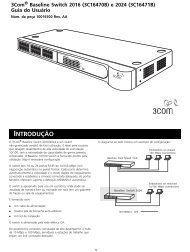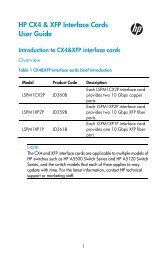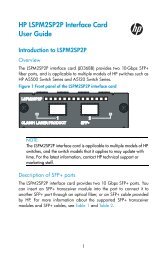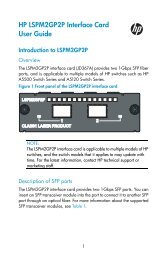HP Integrity Virtual Machines 4.2.5 - HP Business Support Center
HP Integrity Virtual Machines 4.2.5 - HP Business Support Center
HP Integrity Virtual Machines 4.2.5 - HP Business Support Center
Create successful ePaper yourself
Turn your PDF publications into a flip-book with our unique Google optimized e-Paper software.
**************************************************************<br />
* Exception Frame Display: *<br />
…<br />
Crash dump information follows this output.<br />
Use one of the following solutions to fix either of these issues:<br />
• Set the VM Host base_pagesize = 64K (See the base_pagesize(5) manpage for details of<br />
determining and setting the VM Host’s base_pagesize.)<br />
• Set the guest preferred pagesize to 8K:<br />
# hpvmmodify -P vm-name -x tunables=ptsz=13<br />
4.4.4 Guest Device Placement and Adapter Limitation<br />
The OpenVMS guest utilizes the PKDRIVER SCSI port driver and the DKDRIVER SCSI class driver.<br />
A guest configuration uses a UNIX-like algorithm to place storage devices on an AVIO storage<br />
adapter starting with entry “0,0” and continuing through “7,7”, where each AVIO storage adapter<br />
can have up to 128 targets. The default device placement algorithm places 14 devices on each<br />
adapter, in order. Thus, when the guest creation (hpvmcreate) or modification (hpvmmodify)<br />
utility attempts to add a device (using the –a option), it adds, in order, from “0,0,0” through<br />
“0,0,14” before creating a new adapter and starting over again with “0,1,0” through “0,1,14”.<br />
You can specify usage of any target value from 0 through 127.<br />
Each <strong>Integrity</strong> VM adapter corresponds to the OpenVMS controller letters A through Z. The exact<br />
mapping depends on the order of devices found in the guest configuration file. Typically, “0,0”<br />
maps to PKA/DKA, while “0,1” maps to PKB/DKB, and so on. The following are known restrictions:<br />
• The guest target value is a pure number assigned as the unit number of the device. The guest<br />
target value is not the same as a hardware SCSI target, where the disk in the 0th slot would<br />
be DKA0, the disk in the 1st slot would be DKA100, the disk in the 2nd slot would be DKA200,<br />
and so forth. Furthermore, it is not possible to assign the ‘lun’ number for the storage devices,<br />
such as DKA101. Placing a device at “0,0,1” results in the guest device “DKA1:”.<br />
• 16 unique DKDRIVER SCSI class adapters can be created. OpenVMS identifys them as DKAn:<br />
through DKPn:, where ‘n’ is the target value. Attempts to use a 17th adapter results in a port<br />
class PKQ0: being created with no corresponding DKQn: devices. The <strong>Integrity</strong> VM guest<br />
creation (hpvmcreate) and modification (hpvmmodify) utilities are not aware of this<br />
restriction.<br />
You can add devices dynamically by using the hpvmmodify command on the VM Host to add<br />
the storage in conjunction with the OpenVMS command sysman io autoconfigure all on<br />
the guest to find the storage.<br />
4.4.5 OpenVMS System Dump Analyzer (SDA)<br />
Using the OpenVMS SDA command CLUE CONFIG the first time results in a CLUE-W-NOSYMBIOS,<br />
cannot access SYMBIOS table warning. Subsequent CLUE CONFIG commands display<br />
incorrect data. Additionally, using EXAM/PHYS FE000 to view the guests SMBIOS data results<br />
in the message %SDA-E-NOREAD, unable to access location 00000000.000FE000.<br />
This issue seems to affect the SDA utility.<br />
4.4.6 Formatting SYSTEM UUID<br />
The sys$getsyi() or f$getsyi lexical for SYSTEM_UUID appear to return a UUID that is incorrectly<br />
formatted as compared to the value seen in the VM Host's guest configuration output (hpvmstatus<br />
–V –P vm-name). However, the returned value is normal and expected. The returned string needs<br />
to be properly formatted to be viewed as a “normal” UUID. Use the following DCL code to format<br />
and print the UUID value:<br />
4.4 OpenVMS Guests 53


